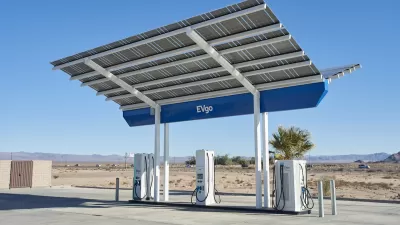On July 22, the congressional attempt to pass comprehensive climate change legislation officially ended for the year. That day the World Resources Institute unveiled a report assessing carbon reductions possible under existing federal and state law.
NYT 'green' blogger John Broder evaluates the WRI report in light of the Senate's failure to pass legislation. It's clear that the EPA's existing authority to regulate carbon emissions under the Clean Air Act would have to play a central role in any reduction effort, says Broder. However, the report concedes that "new legislation is needed to put a price on the emissions from dirty-burning fossil fuels, the group concluded."
"The study (warning: quite wonky) looks at federal and state laws governing greenhouse gas pollutants and asks if they can achieve the goal set by President Obama at the international climate conference in Copenhagen last December - a 17 percent reduction over 2005 levels by 2020.
The short answer from the institute is no. The longer answer is that it depends on how hard federal and state officials try."
From Washington Post editorial: Outlook chilly for a smart climate bill: A range of possibilities remain for possible Senate legislation, e.g. a renewable portfolio mandate, promotion of natural gas and efficiency. "But these are not enough to achieve the size of emissions reductions for which America must aim. The most attractive policy is putting a simple price on carbon, which would encourage private initiative to reduce emissions."
Thanks to California League of Conservation Voters
FULL STORY: After the Climate Bill Failure

Planetizen Federal Action Tracker
A weekly monitor of how Trump’s orders and actions are impacting planners and planning in America.

San Francisco's School District Spent $105M To Build Affordable Housing for Teachers — And That's Just the Beginning
SFUSD joins a growing list of school districts using their land holdings to address housing affordability challenges faced by their own employees.

The Tiny, Adorable $7,000 Car Turning Japan Onto EVs
The single seat Mibot charges from a regular plug as quickly as an iPad, and is about half the price of an average EV.

Seattle's Plan for Adopting Driverless Cars
Equity, safety, accessibility and affordability are front of mind as the city prepares for robotaxis and other autonomous vehicles.

As Trump Phases Out FEMA, Is It Time to Flee the Floodplains?
With less federal funding available for disaster relief efforts, the need to relocate at-risk communities is more urgent than ever.

With Protected Lanes, 460% More People Commute by Bike
For those needing more ammo, more data proving what we already knew is here.
Urban Design for Planners 1: Software Tools
This six-course series explores essential urban design concepts using open source software and equips planners with the tools they need to participate fully in the urban design process.
Planning for Universal Design
Learn the tools for implementing Universal Design in planning regulations.
Smith Gee Studio
City of Charlotte
City of Camden Redevelopment Agency
City of Astoria
Transportation Research & Education Center (TREC) at Portland State University
US High Speed Rail Association
City of Camden Redevelopment Agency
Municipality of Princeton (NJ)




























